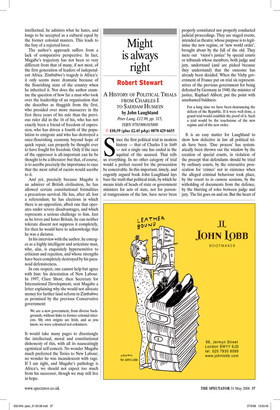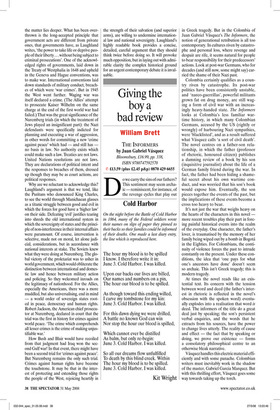Might is always right
Robert Stewart
a hISTory of polITIcal TrIalS from charleS I To Saddam hUSSeIn by John Laughland Peter Lang, £12.99, pp. 315, ISBN 9781906165000 ✆ £10.39 (plus £2.45 p&p) 0870 429 6655 Since the first political trial in modern history — that of Charles I in 1649 — not a single one has ended in the aquittal of the accused. That tells us everything. In no other category of trial would a perfect record for the prosecution be conceivable. In this important, timely, and cogently argued book John Laughland lays bare the truth that political trials, by which he means trials of heads of state or government ministers for acts of state, not for person
Leather122x125 BooksMise en page
al trangressions of the law, have never been properly constituted nor properly conducted judicial proceedings. They are staged events, intended as theatre, whose purpose is to legitimise the new regime, or ‘new world order’, brought about by the fall of the old. They mete out ‘victor’s justice’ by special courts or tribunals whose members, both judge and jury, understand (and are picked because they understand) that the outcome has already been decided. When the Vichy government of France put on trial six representatives of the previous government for being defeated by Germany in 1940, the minister of justice, Raphael Alibert, put the point with unashamed baldness:
For a long time we have been denouncing the defects of the Republic. If it were well done, a grand trial would establish the proof of it. Such a trial would be the touchstone of the new regime and of the new order.
It is an easy matter for Laughland to show how defective in law all political trials have been. ‘Due process’ has systematically been thrown out the window by the creation of special courts, in violation of the precept that defendants should be tried by ordinary courts, by the retroactive prosecution for ‘crimes’ not in existence when the alleged criminal behaviour took place, by the resort to in camera sessions, by the witholding of documents from the defence, by the blurring of roles between judge and
20/05/08 14:41 Page 1
jury. The list goes on and on. But the heart of the matter lies deeper. What has been overthrown is the long-accepted principle that government acts are different from private ones, that governments have, as Laughland writes, ‘the power to take life or deprive people of their liberty . . . without being subject to criminal prosecutions’. One of the acknowledged rights of governments, laid down in the Treaty of Westphalia in 1648 and upheld in the Geneva and Hague conventions, was to make war. International conventions laid down standards of military conduct, breaches of which were ‘war crimes’. But in 1945 the West went further. Waging war was itself declared a crime. (The Allies’ attempt to prosecute Kaiser Wilhelm on the same charge at the end of the first world war had failed.) That was the great significance of the Nuremberg trials (in which the treatment of Jews played an insignificant part): the Nazi defendants were specifically indicted for planning and executing a war of aggression, in other words for committing a new ‘crime against peace’ which had — and still has — no basis in law. No authority exists which could make such a law. Treaties are not laws. United Nations resolutions are not laws. They are declarations of political intent and the responses to breaches of them, dressed up though they may be as court actions, are political responses.
Why are we reluctant to acknowledge this? Laughland’s argument is that we tend, like the Puritans who denounced King Charles, to see the world through Manichaean glasses as a titanic struggle between good and evil in which the forces for good have a ‘higher law’ on their side. Defeating ‘evil’ justifies tearing into shreds the old international system in which the sovereignty of states and the principle of non-interference in their internal affairs were paramount. Of course, intervention is selective, made not on moral, let alone judicial, considerations, but in accordance with national interests at stake. The Soviets knew what they were doing at Nuremberg. The global victory of the proletariat was to usher in world government, which would obliterate the distinction between international and domestic law and hence between military action and policing. So they welcomed inroads on the legitimacy of nationhood. For the Allies, especially the Americans, there was a more muddled, but also universalising, end in mind — a world order of sovereign states rooted in peace, democracy and human rights. Robert Jackson, the American chief prosecutor at Nuremberg, declared in court that the trial was the first in history for crimes against world peace. ‘The crime which comprehends all lesser crimes is the crime of making unjustifiable war.’ How Bush and Blair would have recoiled from that judgment had Iraq won the second Gulf war! In that event, there might have been a second trial for ‘crimes against peace’. But Nuremberg remains the only such trial. Crimes against human rights have become the touchstone. It may be that in the interest of protecting and extending those rights the people of the West, rejoicing heartily in the strength of their salvation (and superior arms), are willing to undermine international law and national sovereignty. Laughland’s highly readable book provides a concise, detailed, careful argument that they should think twice before doing so. It will provoke much opposition, but in laying out with admirable clarity the complex historical ground for an urgent contemporary debate it is invaluable.











































































 Previous page
Previous page